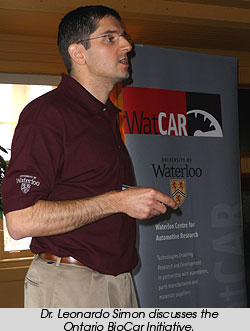Growing the Next Generation Automobile
 On May 22nd, 2008 members of CAMA Ontario were addressed by the University of Waterloo Centre for Automotive Research (WatCAR) as they discussed the future of the automotive industry and the opportunities this is presenting members of the agribusiness community.
On May 22nd, 2008 members of CAMA Ontario were addressed by the University of Waterloo Centre for Automotive Research (WatCAR) as they discussed the future of the automotive industry and the opportunities this is presenting members of the agribusiness community.
Ontario is North America’s largest automotive assembly region, followed by Michigan and Ohio. The importance of this industry to the province and its economy has led the University of Waterloo, Canada’s largest engineering school, to help Tier I, II, and III automotive parts companies research new and innovative parts and manufacturing processes.
“Despite the media coverage reporting automotive assembly plant closures, Ontario continues to thrive in the automotive sector, home to 13 vehicle assembly lines of Chrysler, Ford, General Motors, Honda and Toyota, in addition to hundreds of parts manufacturers and materials suppliers,” says Ross McKenzie, Managing Director of WatCAR.
One project of major significance at WatCAR is the Ontario BioCar Initiative, a $6M joint venture of researchers at the Universities of Guelph, Toronto, Waterloo and Windsor. BioCar was established to research new ways to bring products from fields and forests to the highway, with a focus on replacing petroleum-based products with biochemicals and high content bio-fibre materials.
McKenzie states, “With the changes in people’s sensitivity to the environment, the automobile industry is looking for new and innovative ways to not only create automobiles, but to differentiate themselves from their competition. Finding innovative approaches to produce automobiles with safety, environmental responsibility, and renewability at the forefront are now paramount for manufacturers moving forward.”
Dr. Leonardo Simon, a Chemical Engineering Professor at Waterloo, and key researcher in the BioCar project says, “The outcomes of our research will have a significantly positive effect on the profitability of Ontario farming and forestry industries, and will create a sustainable, competitive edge in the Ontario automotive value chain.”
Some of Dr. Simon’s work includes the use of wheat-straw and other Ontario crops to create biobased products that can be readily incorporated into the current automotive plastics industry. Dr. Simon suggests that all agribusiness organizations have the potential to benefit from the type of innovation being fostered through BioCar. “We need plants that contain the right properties and farmers to grow them. Equipment needs to be designed to properly harvest the parts of the plant required and grain companies to create markets for them. We also need mills capable of processing this material into a consistent form that can be delivered efficiently to manufacturing facilities.” Strategic activities in this area will position the agribusiness stakeholders as sustainable suppliers for the automotive sector.
McKenzie says “Waterloo is unique among universities in North America because of its creator-owned intellectual property policy. Inventions resulting from research at Waterloo are owned by the researcher, not the university, meaning the resulting intellectual property remains between the parties involved in the research project.”
Agribusiness research projects in this emerging segment of automotive related research have the ability to leverage significant amounts of provincial and federal funding. Matching grant programs from both levels of government towards research, combined with R&D tax credits create a very attractive climate for research.
Information on WatCAR: http://watcar.uwaterloo.ca/.
Overview of BioCar: www.bioproductsatguelph/project/biocar.html.
To contact Dr. Simon: 519-888-4567 ext. 33301 or [email protected].
No comments.
No comments are allowed on this page.